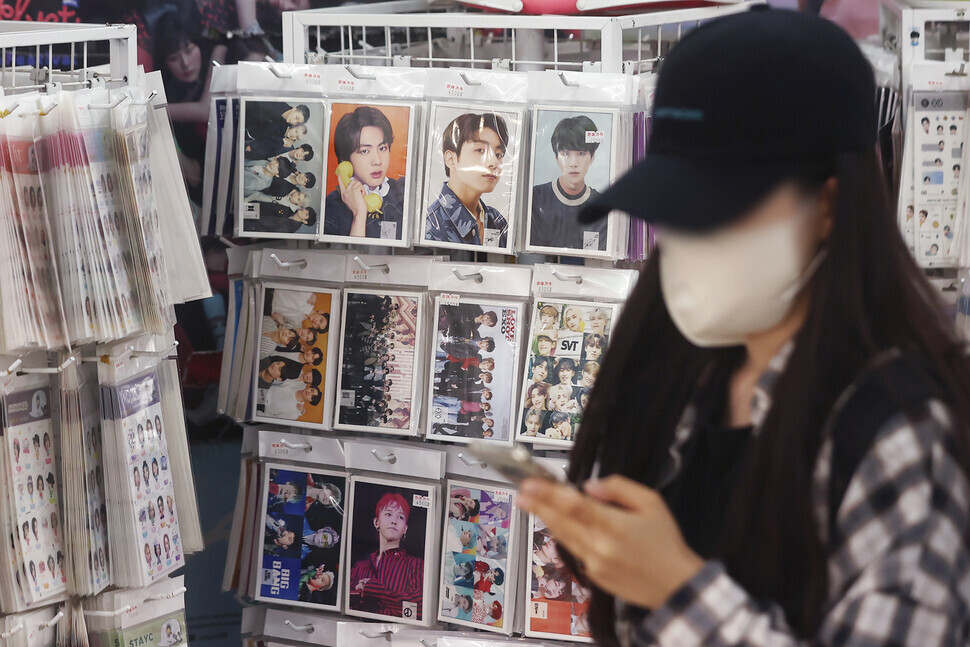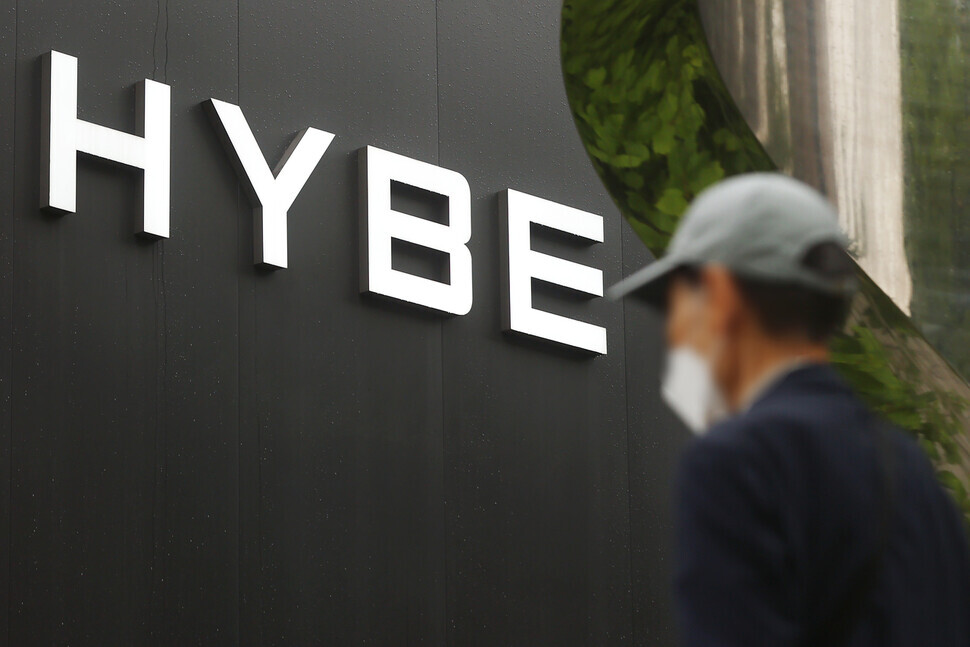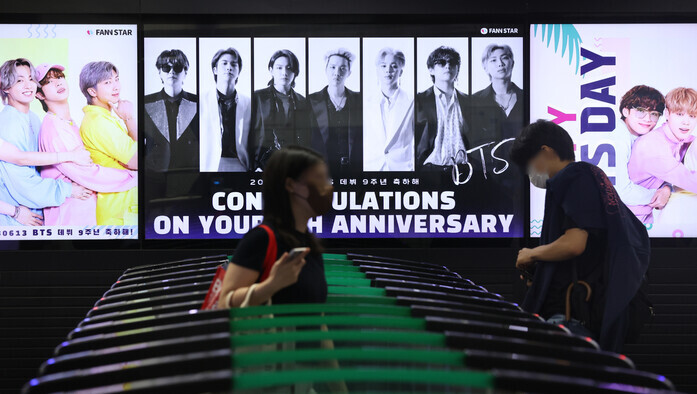hankyoreh
Links to other country sites 다른 나라 사이트 링크
K-pop’s boom as an industry leaves artists feeling pressure to perform

The chronic ills of the K-pop idol system are facing criticism after BTS announced that it will be taking a break from activities as an ensemble nine years since its debut.
In a video released on BTS’ official YouTube channel on Tuesday, the boy band’s leader RM said, “The K-pop idol system itself doesn’t give you time to mature. There’s no time for growth, because you always have to keep doing something.”
By efficiently organizing idols to mass-produce content as quickly as possible via methodical training and control, K-pop has come up with a system that has resulted in international triumphs and has served as a stepping-stone for the industry to surpass J-pop, which once aimed to rise to the top of the global music industry, and gain recognition in the US, the birthplace of pop music.
However, the K-pop idol system has faced constant criticism for its infringement on musicians’ freedom and creativity and for laying bare the harmful effects of capitalism’s focus on consumption. Critics also say idols — who are mostly teenagers — are treated as mere components in an industry that wouldn’t exist without them.

Idols lead day-to-day lives within a military-style system, living together as a group in the same quarters and receiving rigorous group dance training. They have to keep up tight schedules ranging from TV and radio appearances, performances, events, and meet-and-greets with fans, all under the strict management of their agency.
In other words, the system doesn’t allow idols to take breaks when they want to work on their own creative projects.
RM even shed tears in the video, saying, “I worry that you guys [BTS fans] will hate me if I say I want to take a break, as if I’m doing something wrong.”
Pop music critic Kim Jak-ga commented, “The K-pop idol system is the culmination of the content industry as made by a capitalist system led by agencies. [. . .] Although BTS attempted to accomplish the coexistence of music and industry, Hybe’s growth inevitably led to more weight being put on one side, which seems to have resulted in a display of internal conflict.”
The industrialization of K-pop has resulted in the erosion of idols’ creativity and freedom. With major agencies going public, the burden of corporate performance is being passed onto idols signed to those agencies.
Hybe is the first entertainment company to be listed on KOSPI. SM, JYP, and YG are all listed on KOSDAQ. KOSPI demands listing requirements that are much more particular in terms of company size and sales figures compared to KOSDAQ, but Hybe was approved for listing without a hitch.
At the time Hybe went public, Kim Hyeon-yong, a researcher at Hyundai Motor Securities, had said, “Big Hit’s listing on KOSPI has elevated the status of entertainment stocks overall.”

On Wednesday, Hybe shares plummeted in value by 24%, and reports came out one after another that the company lost 2 trillion won in market value in the span of a day.
Like this, idols’ performance directly correlates with their companies’ stock prices. A case in point: around the time Hybe (Big Hit at the time) went public, BTS’ music changed. Previously, BTS members had expressed themselves by writing their own lyrics and songs and playing a role in producing tracks as well.
But around the time Hybe went public, BTS started singing songs written by foreign lyricists and producers. Starting with “Dynamite,” BTS sang in English in “Butter” and “Permission to Dance,” which didn’t necessarily fit in with the group’s style. These songs’ English-language lyrics distinctly evoked the “bubblegum pop” genre, demonstrating that their focus was on targeting the US market.
“Until ‘Dynamite,’ it felt like our team was in our hands, but starting with ‘Butter’ and ‘Permission to Dance,’ I couldn’t get a sense of what kind of group we were,” RM said.
“BTS’ recent releases lacked energy and personality,” commented pop music critic Seo Jeong Min-gap. “Members should have been leading their own way and showing what they’re capable of, but it seems like they’ve been feeling suffocated after simply fulfilling the roles asked by the agency system faithfully.”
As K-pop is increasingly being considered a national industrial project, idols are feeling intense pressure to succeed overseas. With massive capital being invested into K-pop and the industry being driven to growth within a short time frame, idols are being thrust into cut-throat global competition.
Coming up with solutions to these issues is not an easy feat. Still, experts and industry insiders suggested some alternatives.
Pop music critic Lim Jin-mo said, “Agencies should allow their idols more freedom of activity. They should open up paths that enable idols to make music in their own style or collaborate with other singers.”

The CEO of a medium-sized agency said, “The middle ground between idols and indie singers should be expanded further. Currently, even agencies are polarized, with idols being swayed by capital on one side while indie singers can’t even afford to make music on the other.” They added, “A system should be developed whereby more idols who can write their own songs and perform for their own fans without being exploited through their agency’s events and marketing can emerge.”
A manager at a small agency added, “Hybe started out as a small agency as well. [. . .] More space should be made available where idols from small agencies can perform, and broadcast programs should introduce music of various genres.”
By Jung Hyuk-june, staff reporter
Please direct questions or comments to [english@hani.co.kr]

Editorial・opinion
![[Column] Season 2 of special prosecutor probe may be coming to Korea soon [Column] Season 2 of special prosecutor probe may be coming to Korea soon](https://flexible.img.hani.co.kr/flexible/normal/500/300/imgdb/original/2024/0426/3317141030699447.jpg) [Column] Season 2 of special prosecutor probe may be coming to Korea soon
[Column] Season 2 of special prosecutor probe may be coming to Korea soon![[Column] Park Geun-hye déjà vu in Yoon Suk-yeol [Column] Park Geun-hye déjà vu in Yoon Suk-yeol](https://flexible.img.hani.co.kr/flexible/normal/500/300/imgdb/original/2024/0424/651713945113788.jpg) [Column] Park Geun-hye déjà vu in Yoon Suk-yeol
[Column] Park Geun-hye déjà vu in Yoon Suk-yeol- [Editorial] New weight of N. Korea’s nuclear threats makes dialogue all the more urgent
- [Guest essay] The real reason Korea’s new right wants to dub Rhee a founding father
- [Column] ‘Choson’: Is it time we start referring to N. Korea in its own terms?
- [Editorial] Japan’s rewriting of history with Korea has gone too far
- [Column] The president’s questionable capacity for dialogue
- [Column] Are chaebol firms just pizza pies for families to divvy up as they please?
- [Column] Has Korea, too, crossed the Rubicon on China?
- [Correspondent’s column] In Japan’s alliance with US, echoes of its past alliances with UK
Most viewed articles
- 1AI is catching up with humans at a ‘shocking’ rate
- 21 in 5 unwed Korean women want child-free life, study shows
- 3Korea’s 1.3% growth in Q1 signals ‘textbook’ return to growth, says government
- 4Division commander ordered troops to enter raging flood waters before Marine died, survivor says
- 5[Column] Park Geun-hye déjà vu in Yoon Suk-yeol
- 6[Column] Season 2 of special prosecutor probe may be coming to Korea soon
- 7Marriages nosedived 40% over last 10 years in Korea, a factor in low birth rate
- 8[Column] Has Korea, too, crossed the Rubicon on China?
- 9‘Weddingflation’ breaks the bank for Korean couples-to-be
- 10Is Japan about to snatch control of Line messenger from Korea’s Naver?